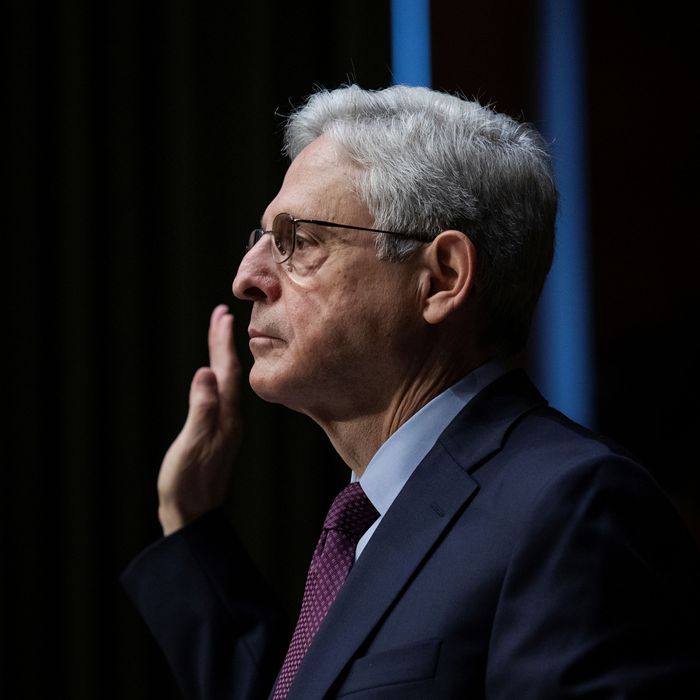
It’s been a rough month for Attorney General Merrick Garland, the man tasked with restoring the rule of law in America and de-politicizing the Department of Justice. Two weeks ago, DOJ prosecutors obtained an indictment of Donald Trump confidante Steve Bannon for contempt of Congress in connection with the House select committee’s investigation of the January 6 siege at the U.S. Capitol — charges that have generated threats of political payback by Republican politicians and that prompted Fox News host Tucker Carlson to complain that “the Biden Justice Department is transforming before our eyes into an armed political instrument whose main job appears to be punishing critics of the Democratic Party.” Days later, House Republicans released an internal FBI memo about a new process to track threats against teachers and school board members for potential prosecution by the DOJ, an initiative that Fox News’ Laura Ingraham and House Republican Jim Jordan proceeded to denounce later that night as another example of political persecution.
It’s tempting to chalk this up to political theater, but there is broader and more persistent dissatisfaction with Garland’s performance. On the left, the time that it took to indict Bannon prompted hand-wringing, shouting on MSNBC, and hyper-defensive reaction columns. On the right, conservatives have been hammering Garland ever since he issued a poorly crafted memo in early October — the precursor to the more recent FBI memo — promising a federal law-enforcement response to “a disturbing spike in harassment, intimidation, and threats of violence against” school officials and later mounted a confused and all-around unimpressive defense of it in testimony before Congress. Garland’s approval rating is down to 30 percent, according to a recent survey from Rasmussen, a conservative-leaning but moderately well-regarded polling outfit.
All of this would seem to be a serious problem for the theory that justified Garland’s nomination to begin with. Garland was a veteran prosecutor who had spent the last 24 years as a federal judge, but Republicans had infamously denied a hearing for his Supreme Court nomination in Barack Obama’s final year in office, turning Garland into a perverse sort of political celebrity. The rationale, at least publicly, was that he was a well-regarded figure who could, as Biden put it when announcing his nomination, “restore trust in the rule of law and equal justice under the law.” Garland himself is quite fond of invoking the rule of law: He has called it “the very foundation of our democracy,” whose essence requires “that like cases are treated alike — that there is not one rule for Democrats and another for Republicans, one rule for friends and another for foes.” He has returned again and again to this idea, including when the Bannon indictment was announced.
For most of the eight months since Garland took office, the debate over his performance among liberals has mostly boiled down to liberal discontent about the apparent lack of post-Trump accountability in various forms. This has included, most notably, the absence of any public indication of a criminal investigation into Trump’s most egregious conduct regarding his finances and his efforts to stay in power after losing to Biden, as well as other, more discrete matters, including the continued defense of Trump in the E. Jean Carroll lawsuit. Garland’s defenders almost seemed to revel in this, on the fatuous theory that upsetting liberals meant that he was doing a good job. In July, CNN reported that “people close to Garland” believed that criticism on the left “was exaggerated and that the attorney general has tried to hold true to his promise to avoid the taint of politics in his decisions.” One DOJ official was quoted as saying, “He is going to disappoint progressives” — a distinctly Biden-like statement that appeared to assume, almost definitionally, that annoying liberals would shore up his bipartisan credentials.
Garland’s pitch was that he would restore the public’s confidence in the integrity of the department’s work, but the available evidence so far does not bode well for success. William Barr was himself not well regarded by the public, but for the moment at least, Garland’s tenure has somehow shaped up to be about as controversial, albeit with different partisan fissures. You can discount public opinion on the theory that the job is not to pander to the public, but public confidence — as Garland himself has noted — is integral to the legitimacy of the department’s work in both the short and long terms, and if it remains low, that is real cause for concern.
Much of Garland’s perilous position is the result of circumstances that are not of his own making. They include the litany of politically controversial issues that Garland inherited after the Trump administration and, perhaps more importantly, a Republican party whose radicalism has forced him to make — and will continue to force him to make — decisions that would previously have been inconceivable. The Bannon prosecution has no recent precedent, but neither does the investigation into him and others to sort through the rubble of an unprecedented, anti-democratic effort to steal the 2020 election. The hundreds of criminal prosecutions of Trump supporters are another inheritance, and making matters worse, conservative politicians and activists persist in making the climate around those cases far more politically volatile than it should be.
Legal observers often use a high-minded but oversimple theory that holds that “politics” has a role in guiding broad policy decisions on how to enforce the law and how to allocate limited resources, but that partisan considerations should not guide decisions in particular cases, much less actual directions from the White House. This is a tidy conceptual distinction that allowed people to criticize the department’s interventions in various cases under Barr while allowing for the possibility of significant policy changes at the department under Biden that were clearly going to be key to Democratic constituencies, particularly on matters of policing and civil rights.
In practice, however, the Garland DOJ has been publicly unwilling to acknowledge this relatively uncontroversial distinction, bristling even at the notion that the views of the actual president — Biden — might have a defensible role to play in the department’s high-level decision-making. Garland and his advisers have been coy about whether the school board memo was prompted by the White House. Biden has also publicly weighed in on some significant but broad law enforcement matters with clear political undertones, including how to conduct investigations involving media outlets, how to resolve the family separation litigation, or whether to prosecute witnesses who are snubbing the select committee. In each case, the department has followed Biden’s wishes while trying to convince people that its decisions were made independently and without regard to any political considerations. They seem incapable of acknowledging, much less defending, the notion that federal law enforcement is more than a technocratic undertaking.
A more fundamental problem with the desire to isolate politics in law enforcement to policymaking is that the law is often indeterminate in specific cases — particularly in the sorts of difficult cases that tend to attract widespread public attention. To many people, the decision to indict Bannon was self-evidently correct, but there were real gaps in the law (mostly because the department has avoided litigating the relevant questions for decades) and in the department’s own guidance on the relevant questions. Lawyers like to say that “the better view” of the law supports their desired outcome in these sorts of cases, but the truth is that lawyers and judges have to bring some of their own principles, values, and long-term interests to guide their decision-making. The case for indicting Bannon had less to do with a particular court decision or rule than it did with the fact that there is a national imperative to understand what happened on January 6 and how to prevent an even worse version of it from happening in the future, and that Bannon’s obstinance, if countenanced, threatens to further neuter Congress’ oversight function.
This sort of decision-making challenge has been present in many of the high-profile questions that the Garland DOJ has confronted, including the particulars of cases like the Carroll lawsuit. There are no unambiguously “correct” answers as a matter of law in these cases, so you need something to fill the conceptual gaps, but ideally it’s more than a strictly electoral calculation. Maybe it’s your conception of justice, equality, fairness, accountability, or transparency, as the case may be, but of course, these values — and how to weigh them in particular cases — are often heavily and politically contested themselves.
The Bannon prosecution may put an end to any hope that Garland had to be an apolitical attorney general in any meaningful sense, but the aspiration may have been doomed to fail from the start. Like Biden, who has spent much of the year with his political options constrained by a largely unified GOP opposition, Garland may be learning that the GOP has just as much say in how he is perceived as his own actions do. That includes the rhetoric of the party’s politicians and media surrogates, but perhaps more importantly, the decisions that its members force through their own recklessness. That is no excuse for making bad decisions on the merits, but it offers a perverse sort of freedom — one that it is far from clear that Garland is capable of fully realizing, since exactly what it is that motivates him in the realm of intangible principles and values remains frustratingly elusive. The rhetoric about “the rule of law” — treating like cases alike and so forth — has gotten tiresome, but more importantly, it has been incomplete and unsatisfactory, bordering on disingenuous. You cannot treat like cases alike when there are no clear precedents. In many ways, and particularly on the issues that have generated the most public attention and frustration, Garland is in uncharted territory. Some forthrightness on this point could go a long way toward engendering the public confidence that he is justifiably intent on securing but that, for the moment, appears to be in very short supply.






























